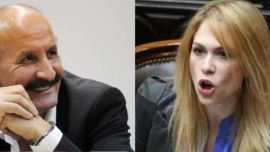When Javier Milei is in an upbeat mood, he shows it by hurling childish insults at those economists, journalists and others who say or write things that rile him. It was therefore to be expected that, after several troublesome months in which he kept tripping himself up, he regained the political initiative by suddenly loosening the government’s hold on the exchange rates and, thanks to US pressure, getting lots of money from the IMF, he would remind them that as far as he is concerned they are all thieves, liars, mercenaries, simians, sodomites and much else besides. It is how he lets off steam.
As has become customary, the President’s latest outburst was severely condemned by those who fear that his words could be followed by official attempts to silence those who annoy him, but few think that Milei, who enjoys nothing more than proclaiming himself a fervent believer in absolute liberty, is toying with the idea of censoring the media or having disrespectful journalists locked up.
While it may be assumed that many other politicians talk like foul-mouthed brats when they are behind closed doors together with cronies who share their prejudices, hardly any behave this way when in public. Both here and abroad, almost all prefer to have the expletives they use in private deleted from the record. Milei is different. He revels in his verbal nastiness. Instead of making an effort to hide the real person behind a suitably polished exterior, he wants everyone to know that he has an extraordinarily thin skin, is willing to trade insults with the best of them and is liable to fly off the handle at any moment. He does not think he needs to be surrounded by image consultants.
Does his fondness for gutter talk harm him? If the polls are anything to go by, only a minority of people find his behaviour so appalling that they would like to see him replaced by someone less irascible. However, though there is no reason to think that it is just an act put on to attract attention and he would much prefer to treat even his fiercest critics with gentlemanly respect, he must feel that his often obnoxious behaviour could help him reach his main objective, which is to win over the bulk of the population to his “libertarian” ethos.
Lectures on the ideas of deceased Austrian economists may impress those who are already familiar with their writings, but they are unlikely to endear him to the denizens of the decrepit neighbourhoods of Greater Buenos Aires and the poverty-stricken Northern parts of the country where a local form of feudalism still thrives. To get the big electoral majority he is after, Milei will have to persuade such people that he is the man, as was Juan Domingo Perón in his moment and after him, Carlos Menem and Néstor Kirchner. To the surprise of many, he does seem to be well on the way to reaching his objective. He has become enviably popular in many jurisdictions far from Buenos Aires which for decades have regularly voted Peronist and there are signs that he is making inroads in La Matanza and other such urban wastelands where he has plenty of youthful supporters.
Milei often takes aim at the Kirchnerites, but when about it he gives the impression that he thinks they have already been consigned to the past but it would suit him to have people believe they still represent the main opposition to his policies. The preferred targets of his choicest epithets are men and, to a lesser extent, women who by and large approve of what he is up to but think he is a bit too prone to underestimate the difficulties that lie ahead.
Most of his favourite whipping-boys are politicians, including some associated with Mauricio Macri, who appeal to the upper middle class or journalists who assume that those who listen to what they say or read what they write are fairly well-educated members of a select minority. If forced to choose between Milei and a Peronist, most would vote for Milei or, failing that, for someone who would support him in Congress. Perhaps that would be enough to keep him in office until his allotted term runs out, but what he evidently wants is to see his own movement become as strong, as broad-based and as durable, as Peronism has been since its inception three-quarters of a century ago.
In politics, tribal feelings count for more than rational arguments. Hardly anyone decides whom to vote for after carefully comparing the programmes of the contenders before deciding which one is most likely to bring about the desired results. With the hypothetical exception of such individuals, if there are any, people let themselves be swayed by how candidates come across on television or a social media outlet, or the way they speak on radio and what others say about them, which is why, when elections are looming, politicians tend to hire experts in advertising rather than policy wonks, useful as these may prove if they have to set about administering a country, a province or a municipality in a constantly changing world in which money is usually tight.
In the United States, Trump, a born-again Republican, managed to win the enthusiastic backing of much of the working and lower middle classes by convincing them that, unlike the snooty Democrats, he was one of them. In Argentina, liberals, like old-guard Republicans in the US, have always been seen as elitists who looked down on ordinary folk, deplored their uncouth customs and were liable to ride roughshod over their interests. Milei is clearly seeking to emulate Trump who turned the Republican Party into a vehicle for the millions who had been left behind in the rush to replace the old industrial economy of the US by a knowledge-based one tailor-made for people with university degrees.
Like his North American idol, Milei wants to take advantage of the failure of self-styled progressives or leftists to cater to the needs or aspirations of the majority of their compatriots. With this in mind, he would dearly like to convert a large number of Peronists into enthusiasts for his variety of liberalism. Though Macri wanted much the same, his ability to appeal to “the masses” has always been limited, but it is at least conceivable that Milei – whom few would take for a representative of the ruling establishment, which he calls “the caste” – could succeed by continually reminding them that he too is angry because there is a great deal to feel angry about.























Comments